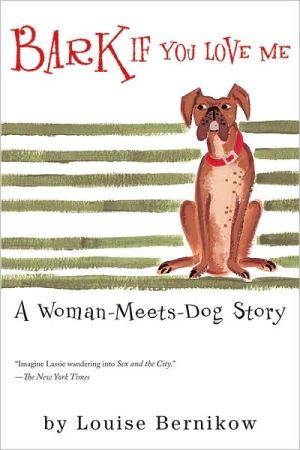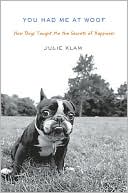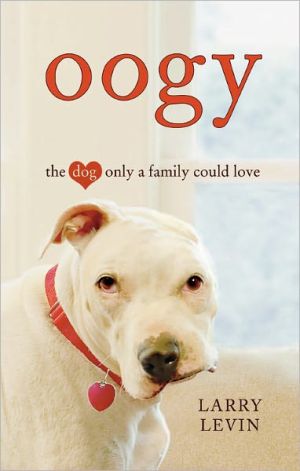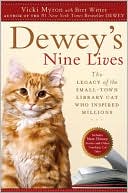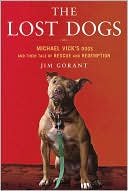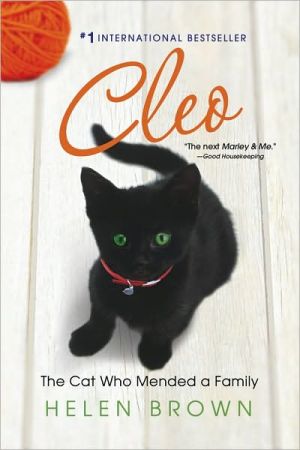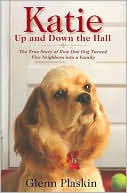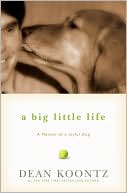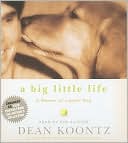Bark If You Love Me
A single city woman meets Mr. Right-he has amber eyes and a wily heart. There's only one catch . . . he has four legs and a tail.\ Relatively indifferent to the natural world, allergic to dogs, and happily independent, writer Louise Bernikow never had a pet and knew nothing about caring for one. But one day while running along Manhattan's Hudson River, she came across an abandoned boxer. He had a gimpy leg and a dim past, but Bernikow instantly, bewilderingly, did the one thing her mother...
Search in google:
What happens when Mr. Right turns out to have four legs and a tail? Bookpage.com - Dee Ann Grand Bark if you'll love this book? This reviewer says, 'Woof! Woof!
The Rescue\ \ On the sunny brink of Memorial Day weekend, I was out for an afternoon run in Riverside Park with nothing much on my calendar for the days ahead and a lot of clutter in my mind. I’d stretched my cramping legs and darted across the Drive, crammed bumper-to-bumper with cars full of people escaping the city. My idea of a holiday was staying home, sleeping, sorting the clutter. I needed a breather.\ \ The stone steps going down into the park reeked of canine and human piss. I exhaled at the bottom and started along the pavement, past an iron-fenced dog run with noisy nattering animals racing around, kicking up dust. On the flattened dirt path that common use had made a jogging trail, a woman of Olympian speed and musculature passed me going in the other direction, then a man and woman moving at a shuffle, hooked together to a Walkman.\ \ The gears meshed and I finally got a stride, until a big shaggy dog chasing a yelping smaller one raced across the path, right at my feet, and almost tripped me.\ \ “Get those dogs on a leash,” I shouted irritably over my shoulder in the general direction of two people standing and talking nearby, leashes dangling from their hands instead of attached to their canines.\ \ I recovered my balance and picked up speed, dodging a Frisbee. Sweat broke through under my arms and across my breastbone.\ \ No more than half a mile along, a police car was stopped along the roadway. People gathered around it. This generally meant a body had been found in the park or, more rarely, a jogger hurt. Since I can’t pass a hubbub without wanting to see what it’s about, I stopped, took a few deep breaths, and walked over. \ The cops had their windows rolled down. On the driver’s side, a woman jiggled a baby in a three-wheeled canvas contraption she had been running with. Around her were several people in business clothes, a man holding two cocker spaniels on leashes, a young Asian woman with a huge long-haired dog lying like a rug at her feet, and another young woman in shorts and a Barnard College T-shirt.\ \ I asked what was going on.\ \ The police had a dog, the Barnard student said, who’d been found beaten, starving, tied to a tree. He needed a home. Oh, please, I thought, with all the trouble in this city, the police are out saving dogs?\ \ “We can’t have pets in the dorms,” the young woman was saying, “or I’d take it.” She looked tragic. It’s only a dog, I thought. Get a grip. I looked over her shoulder, into the car.\ \ He was curled like a cat, a dark brown ball with large amber eyes, huddled on the back seat. The man with the cocker spaniels was telling the cops he wanted the dog, but didn’t think his girlfriend would tolerate another one. Oh, don’t be such a wuss, I thought, but the man’s voice was fading away, like background noise in a movie scene. The woman, baby, and contraption jogged off. \ The dog looked back at me. A boxer’s face, I thought, from meager experience. Flat, dark nose. Those eyes. He didn’t move, just looked me over, wearily, with some curiosity. He was panting and a long pink tongue spilled from his dark, parted lips. \ \ \ I WAS NOT A PERSON well acquainted with dogs or animals of any kind. No childhood memories of bounding with a tail-wagging pup over hill and dale or in the froth of the ocean’s spray, no grandma’s house where Lassie barked with glee at the sight of me, no beloved National Velvet colt hidden away in my heart. Politically, it made sense to save the whales, hug trees, and create humane conditions in which mare’s urine could be collected for transformation into hormones for menopausal women, but I never went to the barricades over animal rights issues. Let’s worry about people first, I always said. And did.\ \ On the Bronx sidewalks of my youth and in the large apartment houses, we were not canine-friendly. We were not, in fact, nature-friendly. “Nature” was laced with dangers, like spiders, wasps, and bees. Cats gave us the willies. Dogs were more scary and dirty to boot. They jumped up on you out of nowhere. They bit. They carried disease and that dreaded stuff called allergens. My mother, whose ostensible job was to guard her pups against the world’s dangers, always said I was allergic to trees, grass, and animals. Who was I, who had suffered asthmatic terrors far too often in my young years, to disagree?\ \ In this, as in most matters, my fearful mother generalized from a small truth. Life so far had proven her only partially right. Most of the perils described to me in my childhood had never materialized. I hadn’t picked up diseases from toilet seats in public bathrooms nor been found dead in the street after a car accident, wearing dirty underwear. Christians hadn’t betrayed me. Men hadn’t used me. I’d actually outgrown childhood problems like asthma and poor eyesight and had come to believe, like most Americans, that I’d left all limitations behind.\ \ But I hadn’t. In Los Angeles once, hobnobbing with movie people and jockeying for a deal, I’d stayed near the beach with an old friend and his two cats. The cats hadn’t registered until I woke in the night, gasping. I wheezed my way out of the house, walked near the shore, inhaling intensely. Although reason said buy medicine, stay elsewhere, make the deal, I went, instead, to the airport. The ticket change was costly, but the plane was mercifully free of cat. The deal fell through. \ Yet for a week or two, some summers, while my friends Alyosha and Lisa left the Berkeley hills to travel, I watched over their house and dog. Ariel, a female black and white Portuguese water spaniel, didn’t make me sneeze, gasp, itch, or flee. I drove around with hersticking her nose out the car’s back window. We climbed the Indian rocks and stared out at San Francisco Bay. I ran the track off The Alameda with her on a leash, perplexed about going in circles. One night, she woke me, making a racket, thumping her tail on the floor. I, who had never been able to give orders to anyone, told her firmly to stop. In the California morning, I discovered, listening to the radio, that Ariel’s tail thumping had been an alert. A minor earthquake had come in the night.\ \ But Ariel belonged to California and my relationship with her was a Pacific Coastinduced aberration, like eating sprouts or saying freeway. At heart, I was a New Yorker, a clotheshorse, a snob, a feminist intellectual, and a world adventurer, happier on banquettes in cafés in the great capitals of the world than in the aisles of the Home Depot. I rented places to live and had no desire to own real estate because I dreaded being anchored. I felt compelled to be ready, at all times, to leave for Paris on a moment’s notice. I was not interested in collaborating or camping, baking bread or raising babies.\ \ That’s who I was or thought I was.\ \ Then, standing in Riverside Park in Manhattan, sweating beside a police car, I did one of the strangest things I’ve ever done: I took the little brown dog home.\ \ I can’t say why. I looked into his eyes and I took him home, just that. I can’t even quite say how. I have no memory of saying yes or of being asked anything about myself or my circumstances by the police. I can’t conjure an image of the car door opening, of the dog scampering out or myself lifting him. I don’t remember “good-byes” and certainly not “good lucks.”\ \ The dog was on his legs, a metal-studded dark leather collar around his neck attached to a chain with a blue cloth handle for a leash. He walked along beside me, looking small, brown, and scared, but agreeable. A posse accompanied us through the park—the Barnard student; the wimpy man with his spaniels; and an opera singer named Lisa who lives in my building and has a small dog named Baxter, both of whom had somehow joined us along the way.\ \ There are many things I know. I can recite the prologue to The Canterbury Tales in Middle English, build bookcases with my own hands, change the motor oil in a car, and tell you why the ERA failed. I also do not lack for daring. But the little brown thing trotting beside me, occasionally stealing a look up, was daunting and a little scary. Was he a killer? A lunatic? Rabid? About to expire?\ \ I had no idea how he worked. What did he eat and how often? Where would he sleep and how much? While Ariel had a yard in Berkeley to dash out to, this character’s yard would be four flights down and three blocks away. How was that supposed to work?\ © 2000 by Louise Bernikow\ \ All rights reserved. No part of this publication may be reproduced or transmitted in any form or by any means, electronic or mechanical, including photocopy, recording, or any information storage and retrieval system, without permission in writing from the publisher.\ \ Requests for permission to make copies of any part of the work should be submitted online at www.harcourt.com/contact or mailed to the following address: Permissions Department, Harcourt, Inc., 6277 Sea Harbor Drive, Orlando, Florida 32887-6777.
ProloguexiHotThe Rescue3Help!15Good Neighbors27El Perro Es Tu Amigo44Bad Mom59Hot Town, Summer in the City71CoolA Star Is Born89Libro in Love103Family Values113A Chill in the Air125Happy Holidays132ColdWinter White143Over the River and through the Woods154Feliz Navidad165Sweethearts172WarmCrackdown179Revelations193Happy Birthday200
\ From Barnes & NobleOur Review\ It's a classic girl-meets-boy tale. Girl -- urban, successful, independent -- doesn't want or need anyone else in her life. Then she meets boy and something in his deep brown eyes inexplicably compels her to bring him back to her place. Soon, they fall madly in love and the rest, as they say, is history. \ But this girl-meets-boy story has an unconventional twist, for "boy" is not exactly a tall, dark, and handsome Prince Charming. Well, on second thought, he may be dark and handsome, but he's actually rather short. And four-legged. You see, "boy" is a dog. A brown boxer, in fact, who is about a year old when "girl," a writer and women's history scholar named Louise Bernikow, happens upon him one sunny afternoon in Manhattan's Riverside Park. Like most relationships, their first year together was alternately blissful and rocky, as they struggled to trust each other and adapt to different lifestyles. Bernikow has recounted that first year in the charming little book Bark if You Love Me.\ Even before the "little brown dog" (who is soon named Libro, the Spanish word for "book") panted his way into her life, Bernikow always saw people as belonging to one of two groups: dog people or antidog people. The division between the two camps is especially notable in New York, her home city, where people live on top of one another and fight daily for precious inches of sidewalk space. So, petless until Libro, Bernikow was decidedly antidog, irritated by unleashed mongrels who nearly tripped her and by the unpleasant traces they left on the sidewalk. Libro's arrival changed her attitude completely.\ Bark if You Love Me is wonderfully entertaining as Bernikow details her defection to the ranks of the dog people. Suddenly, strange new parameters define her life: early morning dog-walking gatherings in the park, dog food brand comparison, vet talk. As the book progresses, Bernikow embarks on a journey to uncover Libro's past, before their fateful park encounter, and, in the process, she begins to gain some new perspective on her own life. The resulting tale is amusing as she recounts parental anxiety when she first leaves Libro for an extended period of time; thoughtful as she analyzes her place in the world as a modern woman and reexamines her notions about family; delightful as she and Libro develop friendships with people in the neighborhood, especially fellow dogs and their owners. (Including a human Prince Charming? Perhaps.)\ Ultimately, Bark if You Love Me is a fun, quick, lighthearted read -- perfect as you sit in the waiting room at the vet's office. And, as in any classic love story, Bernikow and Libro live happily ever after.\ --Stephanie Bowe\ \ \ \ \ \ Imagine Lassie wandering into Sex and the City.\ \ \ Robert LipsyteImagine Lassie wandering into Sex and the City.\ \ \ \ \ Dee Ann GrandBark if you'll love this book? This reviewer says, 'Woof! Woof!\ —Bookpage.com\ \ \ \ \ Publishers WeeklyMost people find that there are defining moments in life: a child's birth, getting married, even chance encounters can all divide an individual's experiences into "before" and "after." For Bernikow, a journalist and lecturer on women's history, life is divided neatly into "before fate dropped a dog into my world" and "after my first pet store visit." While running in Central Park one afternoon, this dedicated pet-hater came upon a crowd gathered around a police car. She wandered over, saw an abused pooch in the back seat and didn't exactly fall in love, although she soon found herself with leash in hand and an admiring ring of spectators. After a few days with the brown boxer she named Libro (Spanish for "book"), she discovered that they were mismatched but splendid pals, so she set off to chat with fellow dog lovers in the park's fenced-in dog-run area. In its lesser moments, the book can be schmaltzy and forced, as when Bernikow speaks of fate and epiphanies, attributing supernatural powers and uncanny intuition to her dog friend. Fortunately, these passages are tempered by Bernikow's description of trotting Libro around New York, meeting people who normally wouldn't bother to talk with her. In these vignettes, she allows her sense of absurdity to shine through, and the work takes on a cosmopolitan tone: "Many people said they'd grown up with boxers or their grandmothers had boxers, which made me feel rather retro, the kid still in stretch pants on the ski slope while everyone else wore microfiber." Her delightful riff on her dog's life will be snapped up like a delicious treat. Agent, Lisa Bankoff, ICM. Author tour. (Oct.) Copyright 2000 Cahners Business Information.\ \ \ \ \ Library JournalThis is a warm and engaging story, without being too gushy, about a big-city woman and an abused year-old brown boxer thrown together by fate for the benefit and betterment of both. For New Yorker Bernikow, a routine run in Riverside Park turned into a lifelong commitment and a loving relationship when she stopped to investigate a cluster of people surrounding a police car. The police were rescuing a small brown dog that had been beaten, starved, and tied to a tree. Although not an "animal" person, Bernikow took the dog home, changing both their lives as a result. In the pages that follow, we meet a kaleidoscope of people as the author and Libro develop friendships in the neighborhood. Bark If You Love Me will be appreciated by anyone who has ever enjoyed the companionship and perspective that only being owned by a dog can provide. Recommended for larger pet collections.--Edell M. Schaefer, Brookfield P.L., WI Copyright 2000 Cahners Business Information.\ \
